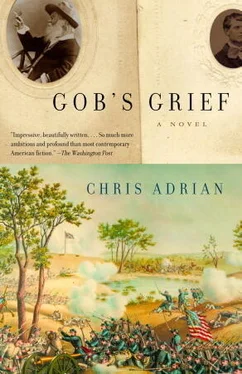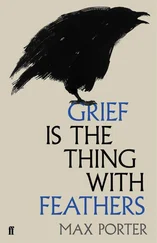It was a very pleasant night, with the moon shining out full. He’d come stomping and cursing through the moonlight to where Will was sitting by the wagon, thinking back to the other side of the river. There’d been plenty of fighting, even at night when Will was free to join it. The beautiful moonlight had settled over everything, though it seemed to Will that it should recoil from boys whose heads decided to go every which way at once, from open bellies and naked bones.
Frenchy cast the plates on the ground at Will’s feet, breaking a plate in half. Will took the pieces up and held them to the moon: there was the boy from the hospital tent, his terrible wounds preserved forever. Will found himself wondering if it was not the opposite of mercy to have preserved them so. The boy in these pictures would always be in pain. His face was a blur — he seemed to have a multiplicity of mouths, all of them calling for his mother. But in the last picture, the broken one, he was still. “It was just as he went,” said Frenchy. “I know that it was, but there is no exhalation, there is nothing but air about him.”
Will left Frenchy to his misery, and walked off with the broken pieces of the last plate in his two hands. He wandered aimlessly through the camp and out of it, thinking that he held in his hands proof of the nonexistence of souls. He thought of Sam, how he had been friendly when they were small, aside from the occasional beating, and how he had been distant when they were older, how they had fallen out with each other over something unspoken and unknown, and how there was no hope of reconciliation between the living and the dead. He sat down on the ground and hung his head. There was a burning behind his eyes, and his belly contracted violently, as if it were trying to retch. He felt his mouth turning down, very slowly, at the corners. He remembered how ugly his mother always was in her weeping, and he tried hard not to cry. Nonetheless, he wept, and as only a boy of his size and strength could, great sobs, his chest heaving with the strength of three lesser chests. It made him afraid to think that everything he was could vanish into an abyss when he took, as he felt he must, his mortal wound. And it made him unbearably sad to think how everything that Sam was had simply ended.
Will had wandered into a graveyard full of Union dead. He’d buried some of them himself the previous winter. After he’d quieted down from his sobbing, he sat there a while, and thought he must have fallen asleep, because he was sure he was dreaming when gaily dressed women drifted into the graveyard. There were seven of them. Four carried lanterns, which they set down in a great square pattern. They put their heads together and whispered, and seemed to be waiting for something. Soon, a little man came tiptoeing into the graveyard. He bowed to them and took out a fiddle from a case, then started to play a jig. The ladies began a sprightly dance upon the graves of the Union dead.
They did not see Will in his dark uniform, did not see how, with their dancing, they turned his sadness to rage. The piece of plate, when it came flying out of the darkness, must have seemed like a judgment from whatever god guards the dignity of the dead. It struck a woman in the hip — in her petticoats or her flesh, Will could not be sure. She shrieked and the ladies dispersed, leaving their lanterns behind.
A boy with a hole where his chest ought to be. He is arranged on his side. His big serious eyes look directly at the camera. His left hand is stretched out, his hand is open as if in supplication, as if to say, Give it back. He is the fourth image from the right, in the second row from the bottom, on the south wall.
“My mama says I should remember that I am fighting to preserve the best government on earth,” Jolly said. It was dinnertime on the evening of the second day at Gettysburg. The Third Onondaga had taken up position too late, again, to have seen action. Other regiments made fun of them, saying their ugly faces scared away the elephant. Will thought it must be his mother’s doing, this safety. Her towering grief would not allow him to be hurt — it was of such a nature that even fate must be afraid of it. “But my father, he says we must help the slaves even if the Union goes all to smash.” Jolly held up two letters, one from his mother and one from his father, in either hand. “What do you think?” he asked Will.
“I don’t know,” Will replied. He took the letters from Jolly’s hand and put them behind his back, passing them from hand to hand a few times before he told Jolly to pick one. Jolly chose the left hand, and Will handed him back the letter. Jolly opened it and looked at it, rubbing his eyes wearily.
“Well?” said Will.
“Well, I am fighting for the slaves,” said Jolly. They sat alone for a while, before they started making their dinner, a coffee beef stew. Jolly had taken off his shirt and rolled up the sleeves of his long johns, because of the heat. They were the only two members of the Leper Mess left, the others having died or deserted or been absorbed into more respectable associations. They spent a little while crushing hardtack for their stew. “God save me from this cracker,” Jolly said, struggling to break it. Will crushed his easily into a fine powder, and made dumplings with water from his canteen. These he set gingerly into the stew, amid pieces of beef and vegetables. Jolly leaned over the pot to pour in a cup of coffee, and then they took turns sprinkling in crushed cracker to thicken the stew. “Oh, it will be delicious!” said Jolly, but when it came time to eat he said he was not hungry, and gave his portion to Will.
After their meal, they lay down in their dog tent, not sleeping though both were exhausted from their recent march — they’d gone twenty miles a day for three days. “I think sometimes it might not be real,” said Jolly. Will’s guts were making a racket, complaining about the stew. “When I was a boy my mother told me the whole world was just the dream of a sleeping bear, and that we had to be careful not to be too horrible in our behavior towards one another, because we might shock the bear into wakefulness, and he would go about his day, and we would be no more. That was blasphemy, I know. But couldn’t a war be God’s conscience fretting with itself? Maybe he has put himself down for a nap, but his digestion is poor, and it has troubled his dream. All our history might be no longer than such a nap, don’t you think? His troubled conscience has dreamed a war. I worry, anyhow, that we will wake him. Do you think we will wake him?”
Will had no answer. In the silence, Jolly took his hand and put it over his chest. Jolly’s heart was fluttering. “Is it beating?” Jolly asked him. “Am I alive?”
“Yes,” said Will, and took away his hand.
“Sometimes I wonder.”
The images look like portraits of ghosts. They are pale where living people are dark, dark where the living are pale. When the sun passes through the glass negatives, it is like a visitation from beyond, the way they shimmer and glow. At night, when he goes into the unfinished house with a lantern, the backing darkness makes ambrotypes of the images, and the dead take on the tones and shades of the living. It makes sense to him that it should be so, that the dead should be more solid, should look more real at night, and that the day should make ghosts of them.
Frenchy had new hope, which stemmed from a new plan and a new technique. He had determined that he’d failed to capture the boy’s departing soul because his medium was insensitive. He needed a better collodion — hadn’t Fox-Talbot’s calotype process been similarly insensitive, hadn’t it also been defective? He was gone for two weeks in June, consulting with a learned gentleman in New York. When he returned, he had a new collodion formula. It was the same as the old one, except he added three drops of a liquid from a mysterious-looking blue bottle. The liquid looked and smelled like whiskey, and Will was tempted to smash the bottle.
Читать дальше












